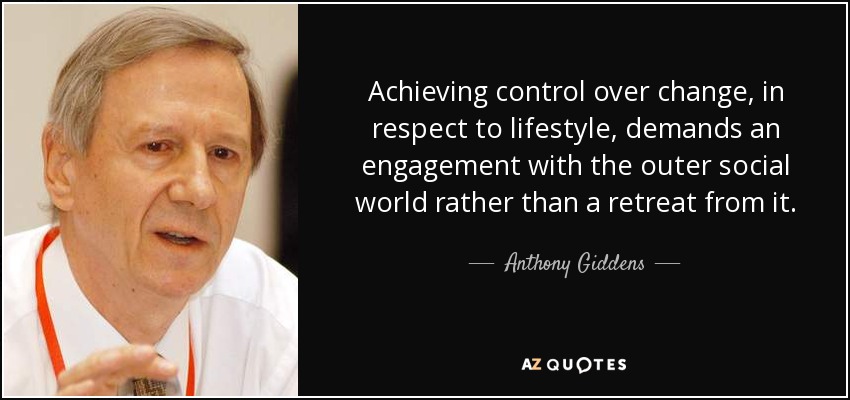
Anthony Giddens
Anthony Giddens, Baron Giddens (born 18 January 1938) is a British sociologist who is renowned for his theory of structuration and his holistic view of modern societies. He is considered to be one of the most prominent modern contributors in the field of sociology, the author of at least 34 books, published in at least 29 languages, issuing on average more than one book every year.
Modernity
It is the short term for Modern Society or Industrial Civilization.
In the modern society, pace, intensity and scope of change are greater. Another important feature is the type and nature of modern institutions. In modern societies by which we mean not societies today but societies where modernity is well developed.
Juggernaut
Giddens has described the modern world as a juggernaut, that is, as an engine of enormous power which can be directed to some extent, but which also threatens to run out of control. The juggernaut is a runaway world with great increases over prior systems in the pace, scope, and profoundness of change.
Giddens defines modernity in terms of four basic institutions. Capitalism is characterized by commodity production, private ownership of capital, wage labor, and a class system derived from these characteristics. Capitalism is a system of production. For a longer period of his life Giddens followed Marxism and therefore, he defines capitalism from Marxian point of view. Production relations are central to any understanding of capitalism. Giddens holds that Marx’s analysis of the mechanism of capitalist production and exchange and his analysis of class domination and exploitation retain their relevance today.
Industrialism involves the use of inanimate power sources and machinery to produce goods, but it also affects transportation, communication, and everyday life.
Surveillance refers to the supervision of the activities of subject populations in the political sphere.
The fourth characteristic is Military power, In the modern world, military power rests with the nation-state. The development and dynamics of military power and warfare affects the shape and structure of capitalist development as well as particular pattern of class and class conflict.
Modernity is given dynamism by three processes. Space and Time distanciation refers to the tendency for modern relationships to be increasingly distant. Relatedly, disembedding involves the lifting out of social relations from local contexts of interaction and their restructuring across indefinite spans of time-space. In such a system, trust becomes necessary because we no longer have full information about social phenomena.
Giddens thinks that modernity has created a distinctive risk profile. Risk becomes global in intensity and in the expansion of contingent events that affect large numbers of people around the world. Our awareness of these risks gives us the sense of insecurity implied in the term juggernaut.
Giddens argues that the reflexivity of modernity extends to the core of the self and becomes a reflexive project of identity formation. For example, the body is subject to a variety of regimes that help individuals mold their bodies. He also argues that intimate relationships have been set apart from the routines of ordinary life. As a result, the reflexive effort to create a pure intimate relationship is usually separate from larger moral issues.
Leave a comment